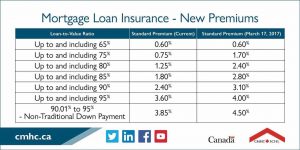So 2016 was an exciting year in the mortgage world! The problem is that we mortgage professionals really hate it when things get exciting in our world. Between the economy and the federally mandated mortgage rule changes and their ensuing fallout, it is now more important than ever to get a solid pre-approval in place. I am not just speaking to first time home owners either! Before you list your current home or refinance your mortgage or consider buying a rental, you need to make sure that you qualify under the new mortgage rules.
The biggest change by far was the increase to the mortgage qualifying rate. Basically, no matter which term you are selecting you will have to qualify at the Bank of Canada posted rate which is currently 4.64%. The mortgage rate you are given will be considerably less than this and will be based on whichever term you choose. The rationale is that there is no way rates were going to stay at 2.39% and all of a sudden a lot of people could be hit with a significant mortgage payment increases which could mean increased foreclosures. When you remember that our federal government is actually financially backing those mortgages through the mortgage insurers, they had a vested interest in keeping the housing market secure.
So the things you need to know:
1. Rates have climbed since the rule changes were announced, so if a new home is in your future get a rate hold in place so you are protected against further increases. Most are good for 120 days.
2. Make sure they are checking your credit and not just seeing how much you are qualified for based on your income. Can you imagine selling your home only to be told that you do not qualify for the financing on the next because of something on your credit bureau? It has happened, I assure you.
3. Given the variety of ways in which we all get paid, you also need to make sure your pre-approval is solid given your situation. For example, the mortgage lenders require a 2 year history on all variable income. That means if your income is commission, bonuses, overtime or shift differential then you will need a 2 year history of it before it can be used for the mortgage qualification.
4. Porting is an area which is slightly misunderstood. You will have to qualify for the mortgage under the new rules even if you are just moving the mortgage from A to B. Please refer back to the previous horror story of the people who had sold and then could not buy a new home.
5. Ironically, the changes now mean that if you are refinancing your home, there is a possibility that you will have a higher mortgage rate than someone putting 5% down. This is because the 5% down mortgage is insured while yours with the significant amount of equity is not making it a higher risk for the bank. If you are considering a refi you may want to do it sooner rather than later given the rate increases.
6. Rental properties have been heavily hit by the changes. Our economy means that fewer lenders are willing to consider these mortgages to start with and those that still are have upped the ante. Some have increased the minimum down to 35% from 20%. Others require a very strong net worth in liquid assets. If you have multiple properties make sure they are reporting on your taxes.
So that’s about that. A solid pre-approval from a qualified mortgage professional is a very good peace of mind strategy for both the new home buyer and those veteran buyers. When you’re ready to talk or if you need more information, please contact me.
